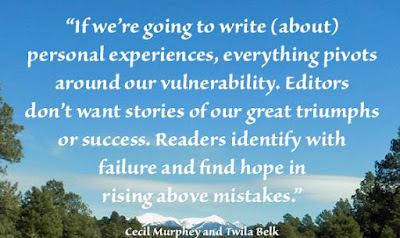“The memoir-crazed 1990s.” Do you remember that era?
William Zinsser (one of my favorite writing mentors) reminds
us that, “Until that decade memoir writers drew a veil over their most shameful
experiences and thoughts; certain civilities were still agreed on by society.
Then talk shows came into their own and shame went out the window.”
It was an era, he says, when “no remembered episode was too
squalid, no family too dysfunctional, to be trotted out for the titillation of
the masses.”
Memoirists, like talk shows, disclosed shocking information,
indulged in self-pity, and sought revenge from those who wronged them.
“Writing was out and whining was in,” says Zinsser.
But, he points out, those types of memoirs didn’t stand the test of time.
“The memoirs we do remember from the 1990s are … Mary Karr’s The Liar’s
Club, Frank McCourt’s Angela’s Ashes, Tobias Wolff’s This Boy’s Life, and Pete
Hamill’s A Drinking Life.” (from “How To Write A Memoir” in The American Scholar; emphasis mine)
“If these books by McCourt, Hamill,
Karr, and Wolff represent the new memoir at its best, it’s because they were
written with love. They elevate the pain of the past with forgiveness, arriving
at a larger truth about families in various stages of brokenness. There’s no
self-pity, no whining, no hunger for revenge…We are not victims, they want us
to know.” (Zinsser’s Inventing the Truth; emphasis mine)
Their stories’ message: “We come from a tribe of fallible people and we have
survived without resentment to get on with our lives.”
He counsels memoirists: “Don’t use your memoir to air old grievances and to settle old
scores; get rid of that anger somewhere else.” (from “How To Write A Memoir” in
The American Scholar; emphasis mine)
That somewhere
else could be a journal or a fictionalized version of the story. Or it could be in a first draft. Dr. Linda Joy Myers says, "Write your first draft as a healing draft. Get out what you need to say. Make it bold and real. Then stand back and think about how you want to revise it for publication." (from Will My Family Get Angry About My Memoir?; emphasis mine)
The important
thing is to vent, to deal with the problem, to find healing and forgiveness and
closure. Just don’t seek revenge in memoir.
There’s another reason to avoid seeking revenge in memoirs. Cecil
Murphey and Twila Belk said well it on Facebook a few days ago: “Whenever I
condemn others, I am condemning myself. Whenever I judge others, I give God
permission to judge me.”
Jesus said it this way, “Do not judge others, and you will
not be judged. For you will be treated
as you treat others. The standard you use in judging is the standard by which
you will be judged. And why worry about the speck in your friend’s eye when you
have a log in your own?… Hypocrite! First get rid of the log in your own eye.…”
(Matthew 7:1-5, NLT)
I suspect that’s what Thomas à Kempis had in mind when he
wrote, “We are too quick to resent and feel what we suffer from others, but
fail to consider how much others suffer from us. Whoever considers his own
defects fully and honestly will find no reason to judge others harshly.”
Yep, nobody’s perfect. Each of us has failures and
shortcomings.
Zinsser, with
grace, encourages us to strive for the best goal: to do all we need to do to “elevate
the pain of the past with forgiveness.”
And isn’t that
what “singing a new song” is all about? (Psalm 40:1-3, Psalm 96:1, Psalm 149:1,
Isaiah 42:10)
And why should
we sing a new song? Because God says, “I, even I, am he who blots out your
transgressions, for my own sake, and remembers your sins no more.” (Isaiah
43:25)
And He says,
“Forget the former things; do not dwell on the past. See, I am doing a new
thing! Now it springs up; do you not perceive it? I am making a way in the
desert and streams in the wasteland.” (Isaiah 43:18-19)
How can we not
sing a new song in praise of the new things God has done in and for us? How can we not sing a new song after God has turned our harsh wilderness into a lush place?
Yes, sing a
new song!
And isn’t that
one of the most important elements of memoir? Memoir is about the old you and
the new you, and how you got there, and what you learned along the way.
“The main
character … —in a memoir it’s you!—is changed significantly by events, actions,
decisions, and epiphanies,” writes Dr. Linda Joy Myers. “The growth and change
of the main character is imperative in any story, and is the primary reason a
memoir is written—to show the arc of character change from beginning to end.”
So, write
about the old you, write about the new you, write about how you got there, and
what you learned.
Sing a new song.
“Elevate the pain of the past with
forgiveness.”
Related posts:







